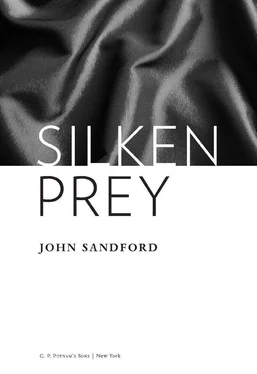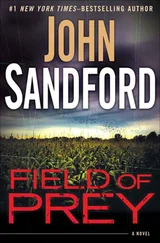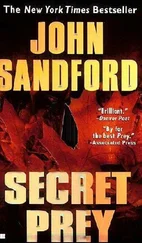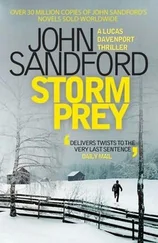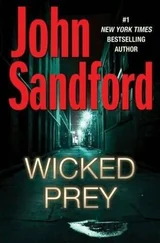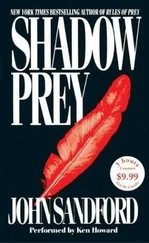“We’ve tested that, and that’s the way it works,” Reynolds said. “You’re looking at the porn, you walk away. In two minutes, the screen blanks. Touch a key, and it comes back up with whatever was on the screen. In this case, the porn file.”
• • •
THERE WASN’T MUCH TO talk about, so Lucas thanked Whidden for the file, and Reynolds for the demonstration, and drove home. He arrived twenty minutes before dinner would be ready, and when Weather asked him if there was anything new, he said, “Yeah. I’ve been asked to prove that Porter Smalls is innocent.”
“Shut up,” she said.
• • •
PORTER SMALLS’S LIST OF campaign staff members came in, more than forty of them, both paid and volunteer. After dinner, Lucas spent a while digging around on the Internet, looking for background on them. He found a few things on Facebook, but quickly realized that nobody was going to post “Guess who I framed?”
He’d just given up when ICE called. “I talked to your wing-nut’s lawyer, and he says we’ll get a copy of the hard drive tomorrow, around ten-thirty, eleven o’clock,” she said.
“I was told you’d get it first thing,” Lucas said.
“Well, I was told that the attorney general’s office wants a representative there, and they’re bringing along their own computer guy. They couldn’t get him there any sooner.”
“I need to talk to you as soon as you’ve got it, but don’t tell anybody you’re bringing it to me. Let them think it’s for Smalls’s attorney and nobody else,” Lucas said. “Could you bring the stuff here, to my place?”
“I’ll have to see what the attorney says, but I don’t see why not.”
“Call me, then,” Lucas said. “One other thing: I’m researching a bunch of people, I really need to get background on them. But all I get from Google is a lot of shit.”
“You know that old thing about ‘Garbage in, garbage out’?” ICE asked.
“Yeah?”
“Google is now the biggest pile of garbage ever assembled on earth,” ICE said. “Give it a couple more years, and you won’t be able to find anything in it. But, hate to tell you, I don’t do databases. I do coding and decoding and some hardware. But I don’t do messaging or databases. I don’t even Tweet.”
“You got anybody who’s good at databases?” Lucas asked. “I really need to get some research done.”
“Yeah. I do know someone. So do you. He probably knows more about databases than anybody in the world. Literally.”
“Who’s that?” Lucas asked.
“Kidd.”
“What kid?”
“Kidd the artist,” ICE said.
“Kidd? The artist?” Lucas knew Kidd fairly well, and knew he did something with computers, in addition to his painting. They’d been jocks at the University of Minnesota around the same time, Lucas in hockey and Kidd as a wrestler. Weather owned one of Kidd’s riverscapes, and had paid dearly for it—a price Lucas would have considered ridiculous, except that Weather had been offered three times what she’d paid, and had been told by an art dealer that the offer wasn’t nearly good enough.
ICE said, “Yeah. Believe me, he does databases.”
“He’s really good?”
“Lucas, the guy’s a legend,” ICE said. “He not only does databases, he does everything. There’s a story—it might not be true—that Steve Jobs was afraid that Microsoft’s new operating system would crush the life out of Apple. This was back in the late nineties, or maybe 2000. So Jobs asked Kidd to help out, and Kidd supposedly said he’d see what he could do. The next Microsoft release . . . well, you’ve heard of Windows ME?”
“Sort of.”
“It did more damage to Windows’ reputation among consumers than anything before or since,” ICE said. “It sucked. It worse than sucked. Supposedly, Kidd had a finger deep in its suckedness.” She hesitated, then said, “Of course, that might all be a fairy tale.”
Lucas said, “Well, I guess I’ll give him a call.”
“Say hello for me,” ICE said. “Tell him if he ever ditches his wife, I’m around.”
“That way, huh?”
“He is so hot . . . don’t even get me started.”
• • •
HOT? KIDD?
Lucas had never thought of Kidd as hot, or even particularly good-looking. He certainly didn’t know anything about fashion—Lucas had never seen him in anything but jeans and tennis shoes and T-shirts or sweatshirts, sometimes with the sleeves cut off. Weather gave money to the Minneapolis Institute of Art, quite a lot of money, and they’d once gone to a function that specified business casual dress, and Kidd was there . . . in jeans, running shoes, and a sweatshirt, but with the sleeves intact. He said it was casual, for his business.
Still, in regard to his hotness . . . Weather seemed to enjoy Kidd’s company. A lot. Sort of like she enjoyed the company of Virgil Flowers, another predator, in Lucas’s opinion. And Kidd had a wife who was herself so hot, in Lucas’s view, that she was either far too good for the likes of Kidd, or . . .
Kidd had something that Lucas didn’t recognize. Not that there was anything wrong with that, Lucas thought.
• • •
LUCAS DUG KIDD’S PHONE number out of his desk and called him. Kidd picked up: “Hey, Davenport,” he said. “Wasn’t there, didn’t do it.”
“How’s Lauren?” Lucas asked.
“Who wants to know? And why?”
“Just making small talk,” Lucas said. “I need to talk to you . . . about computers. A friend told me that you understand databases.”
“What friend?”
“Ingrid Caroline Eccols.” There followed a silence so long that Lucas finally asked, “You still there?”
“Thinking about ICE,” Kidd said. “So, what’s the situation?”
“I’d rather explain it in person,” Lucas said. “But time is short. Would you be around tomorrow, early afternoon?”
“Yeah, but ICE isn’t invited.”
“She’s a problem?”
“I couldn’t even begin to explain the many ways in which she could be a problem,” Kidd said.
“Okay. She’s not invited,” Lucas said.
“Can Lauren sit in?”
Lucas hesitated, then said, “It’s a very confidential matter.”
“She’s a very confidential woman,” Kidd said. “And if it’s that confidential, I’d rather she hear about it. You know, in case I need a witness at some later date.”
“Then fine, she’s invited, if she wants to be there.”
“Oh, she’ll be there,” Kidd said. “She thinks you’re totally hot.”
• • •
TOTALLY HOT.
Everybody was hot, everybody was rich. Better than chasing chicken thieves in Black Duck, Lucas thought, as he settled at his desk with the file from Whidden.
The file looked pretty good, until he opened it. Once opened, half of it turned out to be printouts of 911 conversations, repetitive reports on the seizing of the computer from the campaign offices, and reports of conversations and interviews with office personnel, most of whom knew nothing whatever, and an interview with Brittany Hunt, the volunteer who found the pictures.
Hunt was twenty and had been working as a volunteer since June, and would return to college—Sarah Lawrence—the following winter, having spent half a year working on the campaign.
She knew only slightly more than the completely ignorant office employees. She’d had a report on the ten-year cost of proposed bridge repairs, for which Smalls had gotten appropriations from the feds. She’d walked into his office a little after ten o’clock in the morning, and since Smalls himself had ordered the report, she’d placed it where he’d be sure to see it, and know that she’d fulfilled his request: she dropped it on his keyboard.
Читать дальше
